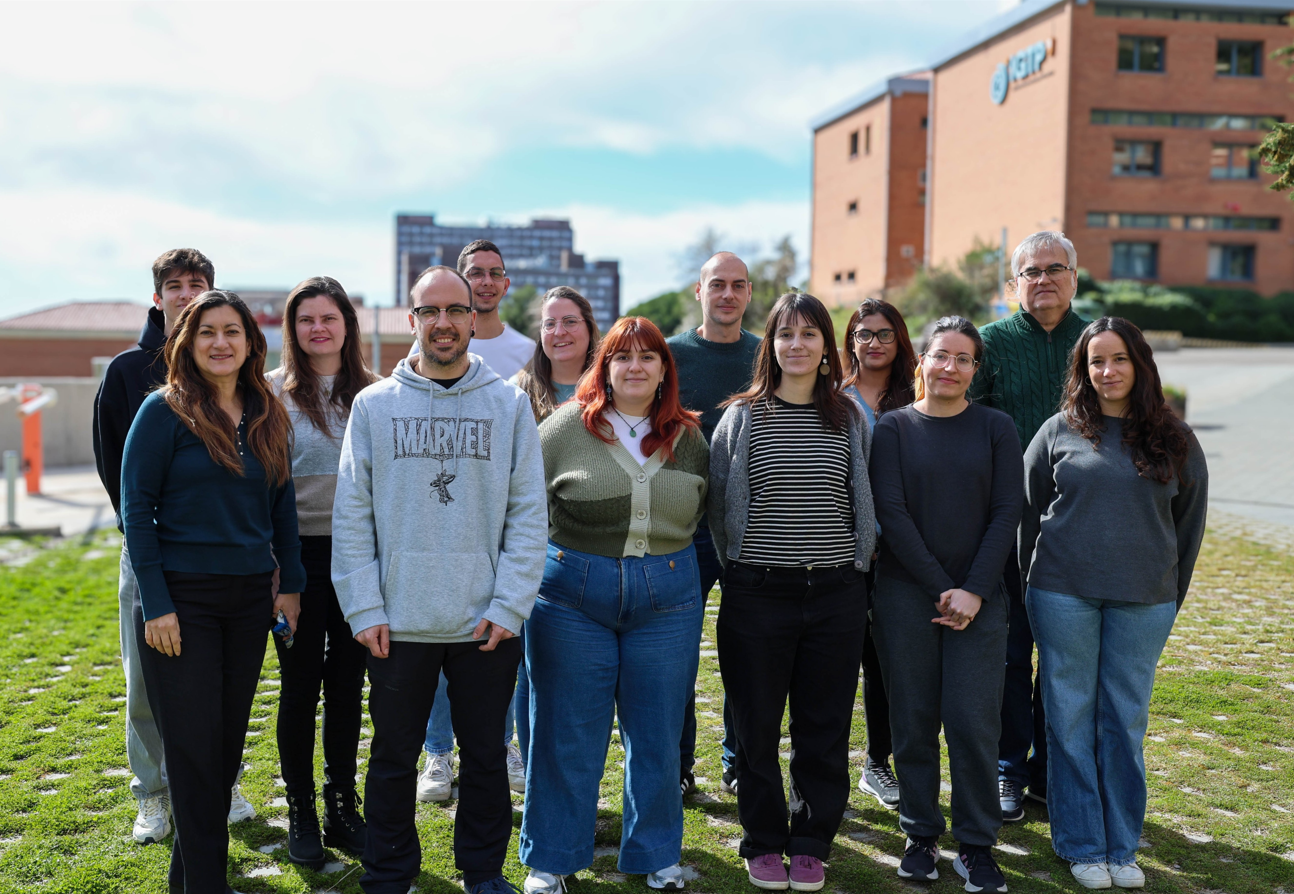About
The Neurogenetics Research Unit was founded by Dr Antoni Matilla Dueñas in 2009 at the IGTP. It is located at the Can Ruti Campus and is integrated within the Department of Neurosciences at Germans Trias i Pujol University Hospital (HUGTiP). The unit also provides genetics diagnoses to the Neurology and Paediatrics Services at HUGTiP and to other centres in Spain and abroad.
The group studies the genetic bases and molecular mechanisms underlying neurodegenerative processes. The ultimate goal of their research is to identify disease causative and modifying genes, their products and the molecular pathways involved in the function and dysfunction of the nervous system to effectively provide genetic diagnosis and identify selective therapeutic approaches for patients. To achieve this, the team uses multidisciplinary approaches including next-generation and long-molecule nanopore DNA and RNA sequencing, functional studies, biochemical, epigenomics, proteomics, transcriptomics, and molecular neurosignaling studies. Scientists in the unit develop large-scale genomics technologies and bioinformatics tools to identify genetic causes underlying neurological diseases.
An important and strategic objective of the unit is to identify and implement treatments for various neurodegenerative diseases. To that end, Drs Antoni Matilla and Ivelisse Sanchez established the functional biology and experimental therapies laboratory at IGTP’s Neurogenetics Unit in 2015. The laboratory uses advanced gene therapy technology based on adenoassociated virus vectors (AAV), screenings of drug compounds and genetic libraries, and in vitro and in vivo preclinical testing of new therapeutic candidates. The group is currently developing an AAV-based gene therapy for the treatment of Friedreich's ataxia. To further develop and implement this gene therapy for Friedreich's Ataxia in patients, Drs Antoni Matilla and Sanchez established the spin-off Biointaxis in 2018.
Keywords: Ataxias, Adenoassociated Viral Vectors (AAV), advanced therapies, cell death, disease biomarkers, gene therapy, genomics, neurodegeneration, neurogenetics, paraplegias.

Group leader
- Antoni Matilla Dueñas, PhD - Head of Unit

Antoni Matilla Dueñas, PhD - Head of Unit
Born in Barcelona, Spain, Antoni Matilla studied Biological Sciences specialising in Genetics and Molecular Biology in the University of Barcelona (1986). He gained his PhD in 1995 on Biochemistry, Genetics, Molecular Biology and Neuroscience on the investigation of the genetic and molecular mechanisms of neurodegeneration in inherited ataxias. He completed his PhD at Baylor College of Medicine in Houston, USA (1995) and obtained a fellowship from the Spanish Research Council to pursue a post-doctoral stage at Baylor College. After a short stay at the Rockefeller University in New York, in 1998, Dr Matilla was granted with a post-doctoral fellowship from the Howard Hughes Medical Institute in the USA to complete his post-doctoral studies at the Eccles Institute of Human Genetics of the University of Utah, in Salt Lake City. From 2000 to 2007, he was Senior Lecturer/Research Group Leader at the Institute of Child Health of the University College London, where he established his own research group. In 2008, he established the Neurogenetics Unit at the Germans Trias i Pujol Research Institute (IGTP) in Badalona, Spain, currently formed by 14 members. The main research interests are the elucidation of the molecular basis of neurodegeneration in inherited ataxias with the aim of identifying and implementing treatments. Dr Matilla has published more than 60 original scientific publications in excellent international journals (Total impact factor: 404) and given more than 130 lectures in Spain and abroad.
He was a member of the Scientific Advisory Board of RARE-bestpractices and associate member of NEUROMICS, both consortiums funded by the 7th FP of the European Commission (2013-2017). From 2004 to 2009, he was the Scientific Coordinator of the EUROSCA project on ataxias also funded by the European Commission. From 2010 to 2013, he coordinated the Ibero-American network for the multidisciplinary study of Parkinson's Disease and spinocerebellar ataxias (RIBERMOV) funded by the Ibero-American Program of Science and Technology for Development (CYTED). He is a co-founder member of the European Ataxia Study Group, and a peer-reviewer of scientific manuscripts for more than 30 scientific journals. He evaluates projects as a scientific expert for national and international government and private agencies including ANEP, AGAUR, Ataxia-UK, the European Commission, the Israel Science Foundation, UK Medical Research Council, the Italian Telemarathon and the Hong Kong Government Health Agency. He is or has been a member of the Scientific Committees of Spanish (FEDAES), Catalan (ACAH), and European (Euro-Ataxia) Patient Associations of which he has also been a member of the Executive Directors Committee, and from 2005 to 2017, he was the Head Editor of the Genetics Section of The Cerebellum (Springer). Dr Matilla is accredited since 2001 in Human Genetics by the Spanish Association of Human Genetics and teaches in several post-graduate programs on human genetics and genetic counseling. Since 2015 he has been a scientific advisor of Sistemas Genómicos S.L., a company located in Valencia, with which he has collaborated since 2010 in the design, development, and validation of multigene diagnostic panels by next-generation sequencing technology. He has several licences with industry and 22 international patents. In 2018, he became Co-founder and CSO of Biointaxis S.L., a spin-off dedicated to develop and implement a gene therapy curative treatment for Friedreich's ataxia.
ORCID: 0000-0002-3514-4181
- Ivelisse Sánchez Díaz, PhD - Group Leader
Team
Administrative manager
Rafael Cantarero Osorio, CFGS(ELIMINAR)
Senior research scientist
Marta Martínez-Lage, PhD
Research scientist
Berta Rosich i Bosch, MSc
Post-doctoral scientists
Gerard Batallé Melgarejo, PhD
Sheeza Mughal, PhD
PhD students
Natalia Benitez Calle, MSc
Nerea Ramírez Martínez, MSc
Master’s student
Marc Sans Falip, BSc
Laboratory manager
Daniel Cota González, CFGS
Technicians
Ginevra Bonelli Rosell, MSc
Aleix Folch Guillen, MSc
Jone Romero Peco, MSc
Research assistant
Nicolás Llanes Vizcaíno, MSc
Research lines
- Identification of the genetic causative deficits and the molecular mechanisms underlying hereditary ataxias, spastic paraplegias and other neurodegenerative disorders
- Genetic diagnosis of over 400 neurological diseases
- Multiomics-based identification of biomarkers of disease progression in Friedreich's ataxia and other neurodegenerative disorders
- Definition of clinical-genetic-molecular correlations implementing machine learning
- Identification of signaling targets and therapeutic strategies for neurological disorders in cellular and animal disease models
- Development of a gene therapy for Friedreich's ataxia and its evaluation in pre-clinical models of the disease
- Establishment of iPS cells and 3D-organoids to validate therapies and disease biomarkers
Active projects
Phoenix: Precision Human Organs-on-chip for Enhanced Neuro-muscular and Cardiac Studies
PIs: Antoni Matilla and Ivelisse Sanchez
Funding agency: European Commission
Agency code: 101156638
Duration: 2025 - 2028
Study of the clinical, genetic and physiopathological bases of hereditary ataxias: identification and characterization of a new spinocerebellar ataxia, SCA52
PIs: Antoni Matilla and Ivelisse Sanchez
Funding agency: Institute of Health Carlos III (ISCIII)
Agency code: PI24/01175
Duration: 2025 - 2027
Gene therapy for Friedreich's Ataxia
PIs: Antoni Matilla and Ivelisse Sanchez
Funding agency: Spanish Ministry of Science, Innovation and Universities (MICIU)
Agency code: CPP CPP2023-010463
Duration: 2024 - 2027
Industrial Doctorate. Gene therapy for Friedreich's ataxia
PI: Antoni Matilla and Ivelisse Sanchez
Funding agency: Spanish Ministry of Science and Innovation
Agency code: DIN2022-012509
Duration: 2023 - 2027
Gene therapy for Friedreich's Ataxia
PI: Antoni Matilla
Funding agency: Fundación Inocente/STOP-FA
Duration: 2024 - 2025
Industrial Doctorate. Gene therapy for Friedreich's ataxia
PI: Antoni Matilla
Funding agency: Agència de Gestió d'Ajuts Universitaris (AGAUR)
Agency code: 2022 DI 102
Duration: 2023 - 2026

Gene therapy for Friedreich's ataxia
PIs: Antoni Matilla and Ivelisse Sanchez
Funding agency: Centre for the Development of Industrial Technology (CDTI) - Institute of Health Carlos III (ISCIII)
Agency code: PMPTA22/00018; IDI-20230057
Duration: 2023 - 2025
Neurogenetics and Neurodegenerative Diseases Consolidated Research Group
PI: Antoni Matilla
Funding agency: Agència de Gestió d'Ajuts Universitaris (AGAUR)
Agency code: 2021 SGR 00541
Duration: 2023 - 2025

Past projects
Preclinical evaluation of a new gene therapy vector based on adenoassociated virus in the reversion of the neurological and cardiac signs in an acute mouse model with Friedreich's ataxia
PI: Antoni Matilla-Dueñas. Co-PI: Ivelisse Sánchez
Funding agency: Instituto de Salud Carlos III (ISCIII)
Agency code: PI20/00647
Duration: 2021 - 2023
Development of an innovative gene therapy drug for the treatment of Friedreich's Ataxia
PI: Antoni Matilla-Dueñas
Funding agency: Ministerio de Ciencia e Innovación Retos-Colaboración
Agency code: RTC2019-006995-1
Duration: 2020 - 2023
Biointaxis S.L. business plan: development of FRATAXAV, a gene therapy drug based on adeno-associated virus AAV to treat Friedreich's ataxia
Funding agency: Centro para el Desarrollo Tecnológico Industrial (CDTI)
Agency code: EXP-00123449/SNEO-20191074
Duration: 2020 - 2022
A first-in-class AAV-gene therapy for the curative treatment of Friedreich's Ataxia
PI: Antoni Matilla
Funding agency: Fundación "La Caixa"
Agency code: CL91-00017
Duration: 2020 - 2024
ISCIII-CDTI de Innovaciones en medicina personalizada y terapias avanzadas: Gene therapy for Friedreich's ataxia
PI: Antoni Matilla-Dueñas, Ivelisse Sánchez
Funding agency: Centro para el Desarrollo Tecnológico Industrial (CDTI), Instituto de Salud Carlos III (ISCIII)
Agency code: PMPTA22/00018; IDI-20230057
Duration: 2023 - 2024

Pre-clinical validation of a novel gene therapy for a rare disease in non-human primates: integrative approach to the CMC scale-up process validation of a gene therapy product for Friedreich Ataxia
PI: Ivelisse Sanchez
Funding agency: European Commission
Agency code: WomenTech 101114192
Duration: 2023 - 2024
Scientific publications
Highlighted publications
Sanchez-Flores M, Corral-Juan M, Gasch-Navalón E, Cirillo D, Sanchez I, Matilla-Dueñas A. Novel genotype-phenotype correlations, differential cerebellar allele-specific methylation, and a common origin of the (ATTTC)n insertion in spinocerebellar ataxia type 37. Hum Genet. 2024 Mar;143(3):211-232. DOI: 10.1007/s00439-024-02644-7.
Corral-Juan M, Casquero P, Giraldo-Restrepo N, Laurie S, Martinez-Piñeiro A, Mateo-Montero RC, Ispierto L, Vilas D, Tolosa E, Volpini V, Alvarez-Ramo R, Sánchez I, Matilla-Dueñas A. New spinocerebellar ataxia subtype caused by SAMD9L mutation triggering mitochondrial dysregulation (SCA49). Brain Commun. 2022 Feb 10;4(2):fcac030. DOI: 10.1093/braincomms/fcac030.
Corral-Juan M, Serrano-Munuera C, Rábano A, Cota-González D, Segarra-Roca A, Ispierto L, Cano-Orgaz AT, Adarmes AD, Méndez-Del-Barrio C, Jesús S, Mir P, Volpini V, Alvarez-Ramo R, Sánchez I, Matilla-Dueñas A. Clinical, genetic and neuropathological characterization of spinocerebellar ataxia type 37. Brain. 2018 Jul 1;141(7):1981-1997. DOI: 10.1093/brain/awy137.
Serrano-Munuera C, Corral-Juan M, Stevanin G, San Nicolás H, Roig C, Corral J, Campos B, de Jorge L, Morcillo-Suárez C, Navarro A, Forlani S, Durr A, Kulisevsky J, Brice A, Sánchez I, Volpini V, Matilla-Dueñas A. New subtype of spinocerebellar ataxia with altered vertical eye movements mapping to chromosome 1p32. JAMA Neurol. 2013 Jun;70(6):764-71. DOI: 10.1001/jamaneurol.2013.2311.
Sánchez I, Balagué E, Matilla-Dueñas A. Ataxin-1 regulates the cerebellar bioenergetics proteome through the GSK3β-mTOR pathway which is altered in Spinocerebellar ataxia type 1 (SCA1). Hum Mol Genet. 2016 Sep 15;25(18):4021-4040. DOI: 10.1093/hmg/ddw242.
Additional information
Collaborative networks
- EU Phoenix Consortium: an European Consortium to establish, characterize and implement Precision Human Organs-on-chip for enhanced neuro-muscular and cardiac studies. PHOENIX will integrate four precision technologies on organ-on-chip devices, personalised models that reproduce miniature organs and tissues from human stem cells to obtain precision diagnosis and validate therapies.

- Spanish Scientific Collaborative consortium on Friedreich's Ataxia: four excellent affiliated Research Institutes and Hospitals including IGTP-Hospital Germans Trias i Pujol in Badalona (Barcelona), IDIPAZ-Hospital La Paz (Madrid), IDIBGI-Hospital Dr Josep Trueta (Girona), and IDIVAL-Hospital de Valdecilla (Santander) collaborate to identify clinically relevant biomarkers of disease progression with the aim to establish and validate a gene therapy for Friedreich's ataxia, an orphan disease without treatment.
Doctoral theses
Title: Molecular physiopathology study of VPS13D-ataxia in a Spanish patient
Author: Gabriela Chabrzyk
University: Universitat Autònoma de Barcelona
Date of defence: 2024
Title: Identification of potential biomarkers of disease progression in Friedreich's Ataxia
Author: Nicolás Llanes Vizcaíno
University: Universitat de Barcelona
Date of defence: 2024
Master’s theses
Title: Genetic, cellular and molecular insights into VPS13D-ataxia
Author: Gabriela Chabrzyk
University: Universitat Autònoma de Barcelona
Currently in progress
Title: Characterization of the biodistribution of recombinant frataxin protein in the Friedreich ataxia mouse model treated with AAV-FXN gene therapy
Author: José Cánovas Marín
University: Universitat Autònoma de Barcelona
Date of defence: 2023
Title: A new CRISPRCas9 target sequence enrichment for the analysis of the expanded region in FXN, its methylation profile and expression
Author: Natalia Benitez Calle
University: Universitat Autònoma de Barcelona
Date of defence: 2022
Title: Transcriptomic biomarkers of disease progression in Friedreich Ataxia
Author: Nicolás Llanes Vizcaíno
University: University of Barcelona
Currently in progress
Title: Undiagnosed inherited ataxias: identification of a novel spinocerebellar ataxia subtype
Author: Nerea Ramírez Martínez
University: Universitat Pompeu Fabra
Date of defence: 2023
Title: Targeted nanopore sequencing of the SCA37 (ATTTC)n expanded insertion within the DAB1 gene proves a common origin and differential methylation
Author: Marina Sánchez Flores
University: University of Barcelona
Date of defence: 2022
Innovation
Biointaxis S.L. is an academic biotech spin-off established in 2018 from the Germans Trias i Pujol Research Institute (IGTP) located in Badalona, dedicated to scientific and technical research leading to the development and commercialization of genomic treatments and technologies for neurological diseases. The company is currently developing an innovative gene therapy for the treatment of Friedreich's ataxia, a rare neurological disease for which there is no treatment.
The team has been granted with 22 international patents "Vectors for the treatment of Friedreich's ataxia" (WO2019076973) licenced to Biointaxis S.L.

Outreach
Drs Antoni Matilla and Ivelisse Sanchez are highly engaged in the dissemination of ataxia disorders to society by actively collaborating with patient associations including the Spanish Federation of Ataxias Associations (FEDAES), the Ataxia Catalan Association (ACAH), Fundación ALMAR, and the Association to Stop Friedreich's Ataxia (STOP-FA).
News
IGTP strengthens its presence at BIOSPAIN 2025 as a benchmark in innovation and knowledge transfer
The Institute has taken part in BIOSPAIN 2025, the leading biotechnology event in southern Europe, with the aim of strengthening its knowledge and technology transfer strategy, showcasing its innovation capabilities, and fostering new collaborations with companies, investors, and stakeholders across the biomedical ecosystem.
Can Ruti reaffirms its commitment to rare diseases in an interdisciplinary event
On Friday 28 February, HUGTiP and IGTP held a new edition of their event to mark Rare Disease Day. The event brought together healthcare professionals and researchers to share knowledge and experiences in the field. The program also included the patient perspective in the final part of the event.
Contact
Neurogenetics Unit
More links
Donate via Amics de Can Ruti · Follow @AntoniMatilla on X · Follow @NG_IGTP on X · Biointaxis S.L. · STOP-FA
